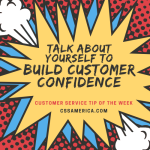The National Survey of Student Engagement (NSSE) conducts annual surveys of college and university students which address personal development, support from their faculty, and other factors driving student satisfaction.
The institutions are graded on such attributes as how supportive they are of student success, the promptness of feedback on student performance, rates of transfers in, etc.
So why is this information important? Isn’t this just another customer satisfaction survey? Sure it is, but this illustrates why such surveys are important. Students make their own decisions about staying or going, they offer word-of-mouth to friends and family about the institutions they attend, they decide whether to continue into graduate school there or to go elsewhere based in large part on their opinions of the institution.
Am I learning? Am I growing? Am I in a supportive environment? Am I being challenged to improve?
Any college or university can create the classes, the culture, and the campus they want. But at some point they have to assess if it’s the classes, the culture, and the campus that the STUDENTS want. At some point, they have to view the student as a customer, with needs and wants, preferences and priorities.
Surveys such as these create that opportunity for the student to be viewed as that important asset to the long-term success of the organization.
Now it’s just a matter on institutions acting on the information.
Interested in improving your company’s customer service? See more information at: http://www.cssamerica.com/





















